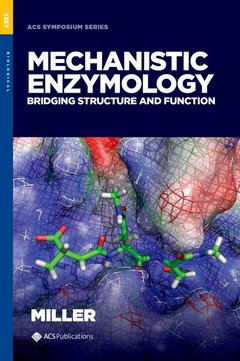Description
Mechanistic Enzymology
Bridging Structure and Function
ACS Symposium Series
Coordinator: Miller Justin M.
Language: English
Subject for Mechanistic Enzymology:
Publication date: 10-2021
224 p. · 18.1x26.1 cm · Hardback
224 p. · 18.1x26.1 cm · Hardback
Description
/li>Biography
/li>
Theoretical, computational, and experimental perspectives Mechanistic enzymology is the basis of many applications, from drug design to cleaning products. This work offers a timely synopsis of advanced understanding of enzymatic regulation and function. Chapters are authored by both those in traditional protein studies and those challenging paradigms, bridging disconnected fields, and presenting a unified view of enzyme mechanisms. Biochemists, structural biologists, and other researchers working with enzymes will find this work useful. Each chapter is written to maximize accessibility for students and bridge developed theory with current scientific literature. This volume serves as a valuable teaching tool to introduce foundational topics to students, bridging distantly connected fields toward the presentation of a unified view of enzyme mechanism.
Justin M. Miller is Assistant Professor in the Department of Chemistry at Middle Tennessee State University. He teaches biochemistry on the undergraduate and graduate levels with a particular emphasis on the application of biophysical chemistry towards studies of mechanistic enzymology. A major goal in his teaching efforts is to demonstrate to students the accessibility of enzymology, where the discipline is often viewed as beyond their grasp. Miller seeks to utilize research as a major teaching tool that allows students to develop an appreciation for mechanistic enzymology. He leads a productive research laboratory that includes a mixture of Ph.D., M.S., and undergraduate students focused on the elucidation of the mechanistic details underlying enzyme function. Systems of study include the AAA+ molecular machines involved in mitochondrial maintenance of protein quality control as well as hydrolase enzymes that catalyze the degradation of biodegradable polymers of industrial relevance.
© 2024 LAVOISIER S.A.S.




